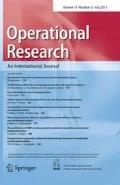Abstract
This paper presents a hybrid decomposition procedure for solving the resource-constrained project scheduling problem. The procedure finds an initial schedule for the project, and refines it through a decomposition process. This is performed through a refinement process which consists of (i) analyzing the initial schedule to find appropriate decomposition point(s), (ii) decomposing the associated project into appropriate subprojects, (iii) optimizing the subprojects by an efficient implicit enumeration technique, and subsequently (iv) integrating optimal sub-schedules to create a feasible schedule. This refinement process is aimed at reducing the makespan of the initial schedule. To achieve further reduction, the refined schedule is overrefined by a genetic algorithm. The results of computational experiments performed on 2,040 benchmark instances indicate that in a reasonable time the procedure can obtain solutions whose average percentage deviation from their associated best solutions in the litrature is 0.41.









Similar content being viewed by others
References
Bedworth DD, Bailey JE (1982) Integrated production control systems-management, analysis, design. Wiley, New York
Debels D, Vanhoucke M (2007) A decomposition-based genetic algorithm for the resource-constrained project-scheduling problem. Oper Res 55(3):457
Hartmann S, Kolisch R (2000) Experimental evaluation of state-of-the-art heuristics for the resource-constrained project scheduling problem. Eur J Oper Res (127):394–407
Kelley J (1963) The critical-path method: resource planning and scheduling. Industrial scheduling. M. J. F. a. T. G. L. Prentice-Hall, New Jersey, pp 347–365
Kolisch R (1996a) Efficient priority rules for the resource-constrained project scheduling problem. J Oper Manage 14(3):179–192
Kolisch R (1996b) Serial and parallel resource-constrained project scheduling methods revisited: theory and computation. Eur J Oper Res 90:320–333
Kolisch R, Hartmann S (2006) Experimental investigation of heuristics for resource-constrained project scheduling: an update. Eur J Oper Res 174(1):23–37
Kolisch R, Sprecher A (1996) PSPLIB—a project scheduling library. Eur J Oper Res 96:205–216
Korf RE (1985) An optimal admissible tree search. Artif Intell 27:97–100
Korf RE (1990) Real-time heuristic search. Artif Intell 42(2):189–211
Li K, Willis R (1992) An iterative scheduling technique for resource-constrained project. Scheduling. Eur J Oper Res 56:370–379
Möhring RH (1984) Minimizing costs of resource requirements in project networks subject to fix completion time. Oper Res 32:89–120
Mori M, Tseng C (1997) A genetic algorithm for multi-mode resource constrained project scheduling problem. Eur J Oper Res 100:134–141
Özdamar L, Ulusoy G (1995) A survey on the resource-constrained project scheduling problem. IIE Trans 27:574–586
Palpant M, Artigues C et al (2004) LSSPER: solving the resource-constrained project scheduling problem with large neighbourhood search. Ann Oper Res 131(1):237–257
Panagiotakopoulos D (1977a) Cost-time model for large CPM project networks. J Constr Div 103(CO2):201–211
Panagiotakopoulos D (1977b) A CPM time-cost computational algorithm for arbitrary activity cost functions. INFOR 15(2):183–195
Raymond L, Bergeron F (2008) Project management information systems: an empirical study of their impact on project managers and project success. Int J Proj Manage 26(2):213–220
Sprecher A (2002) Network decomposition techniques for resource-constrained project scheduling. Oper Res Soc 53:405–414
Stinson JP (1978) Multiple resource-constrained scheduling using branch and bound. AIIE Trans 28(1):1–7
Tormos P, Lova A (2001) A competitive heuristic solution technique for resource-constrained project scheduling. Ann Oper Res 102(1):65–81
Tseng L-Y, Chen S-C (2006) A hybrid metaheuristic for the resource-constrained project scheduling problem. Eur J Oper Res 175(2):707–721
Valls V, Quintanilla S et al (2003) Resource-constrained project scheduling: a critical activity reordering heuristic. Eur J Oper Res 149(2):282–301
Valls V, Ballestin F et al (2004) A population-based approach to the resource-constrained project scheduling problem. Ann Oper Res 131(1):305–324
Valls V, Ballestin F et al (2005) Justification and RCPSP: a technique that pays. Eur J Oper Res 165(2):375–386
Valls V, Ballestin F et al (2008) A hybrid genetic algorithm for the resource-constrained project scheduling problem. Eur J Oper Res 185(2):495–508
Zamani R (2004a) An effective near-optimal state-space search method: an application to a scheduling problem. Artif Intell Rev 22(1):41–69
Zamani R (2004b) An efficient time-windowing procedure for scheduling projects under multiple resource constraints. OR Spectr 26(3):423–440
Zamani R, Lau SK (2010) Embedding learning capability in Lagrangean relaxation: an application to the travelling salesman problem. Eur J Oper Res 201:82–88
Author information
Authors and Affiliations
Corresponding author
Rights and permissions
About this article
Cite this article
Zamani, R. A hybrid decomposition procedure for scheduling projects under multiple resource constraints. Oper Res Int J 11, 93–111 (2011). https://doi.org/10.1007/s12351-009-0073-3
Received:
Revised:
Accepted:
Published:
Issue Date:
DOI: https://doi.org/10.1007/s12351-009-0073-3




